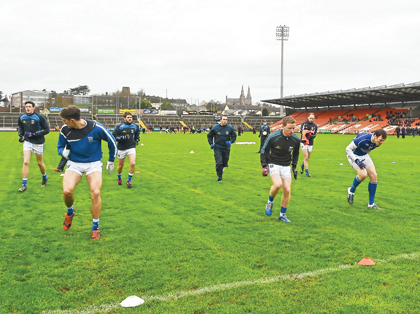
Cavan players in the warm up
I AM a huge believer in non-stop learning when it comes to coaching and a club that provides its coaches with an opportunity to learn is without doubt a forward thinking club.
I have been very privileged and honoured to have been asked to facilitate a number of coaching workshops for underage coaches in a number of clubs over the past few months, a brilliant initiative by any club and it’s a fantastic time of the year for coaches to hopefully gain a little more knowledge which, in turn, will hopefully lead to them providing a higher quality coaching and training environment for their players.
I am an advocate of shared learning or sharing knowledge, I believe it’s an extremely effective way of improving you’re coaching by picking up ideas, thoughts and methods from other coaches and it’s something I would do quite regularly.
In these workshops I delivered recently, it carried three main themes, the first being what should effective coaching consist off, the second theme was what should a typical session include and the third was how do we keep our young people involved in Gaelic Games.
The theme for this week’s article is probably the one that appeals to most coaches at this time of year as they commence pitch sessions, what should we include in a typical session?
A number of years ago, approximately seven, there was a major drive to change the focus in a coaching session by encouraging coaches to implement a games-based approach to training rather than the traditional skills and drills.
At the annual games and development conference in Croke Park, Donie Buckley, Michael McGeehin and Martin Fogarty all delivered excellent innovative games-based pitch sessions relevant to football and hurling on the Croke Park pitch while the attending coaches watched in the stand.
It was trying to get coaches away from the philosophy of taking the safe option and building the session round drills but to be brave and facilitate a training environment which allowed players to take ownership and work out problems through games.
Obviously there is a certain amount of time needed in any given session at any level dedicated to skill refinement through drills based exercise but the majority of the session now should be games.
In a typical training session now, my warm up would always involve the ball, indeed the ball would always be at the heart of the session, but more so at underage level.
The majority of the session would be conditioned games, ranging from 3v3 to 15v15 depending on time of year, age of squad, numbers at training or level your performing at.
Games have so many more benefits players are having to constantly think and make regular decisions, more 2v1, 2v2, 3v2 game related situations arise, helping the players to exploit and create space, it’s a pressure environment and players are easily conditioned in a relevant game style.
Here would be a typical session plan I would use as a template to any session I deliver now, time approximately 50-70 minutes long depending on the time of the year and what age group you are taking;
1. Warm-up – Dynamic game related warm-up encouraging multiple ball contact (12-15mins)
2. Skill Refinement – A number of game related drills to help refine the basic skills (6-8mins)
3. Games – Will be the majority of the session and could include full sided, small-sided games or conditioned games working on a particular game related theme or focus. (25-30mins)
4. Cool Down – Will include a winding down stretch and some form of fun activity (8-10mins)
Receive quality journalism wherever you are, on any device. Keep up to date from the comfort of your own home with a digital subscription.
Any time | Any place | Anywhere











